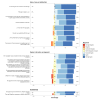Evaluating User Experience and Satisfaction in a Concussion Rehabilitation App: Usability Study
- PMID: 40215401
- PMCID: PMC12007725
- DOI: 10.2196/67275
Evaluating User Experience and Satisfaction in a Concussion Rehabilitation App: Usability Study
Abstract
Background: Evidence-based guidelines support the use of structured exercise to facilitate concussion recovery. Despite the growing number of mobile health (mHealth) apps aimed at managing concussions, few focus on delivering exercise rehabilitation protocols. Therefore, a mobile app was developed to provide personalized rehabilitation programs based on evidence-based exercise principles designed to cater to individuals recovering from concussions.
Objective: This study aimed to evaluate the usability and user experience of a mobile app designed to deliver an evidence-based rehabilitation program to individuals recovering from concussions.
Methods: A two-week prospective single-arm pilot study was conducted among adults with a physician-diagnosed concussion. Participants engaged in home-based rehabilitation exercises through a mobile app. Usability was assessed using a combination of the mHealth App Usability Questionnaire (MAUQ) and five custom questions evaluating confidence in recommendations, exercise flow, clarity of voice commands, and usability of the exercise report feature. Following the two-week period, participants rated each question on a 7-point Likert scale ranging from "strongly agree" to "strongly disagree".
Results: Twenty-six participants consented and were enrolled in the study, with 23 participants (82%) completing all study components at the end of two weeks. The majority of participants were women, aged 26-38 years, and on average, approximately at three months postconcussion. Responses to both the MAUQ and custom questions were overwhelmingly positive. Overall, seven MAUQ questions received 100% positive responses, with no single question scoring below 83% positive responses. In the "ease of use and satisfaction" category, 100% of users responded positively to questions on ease of learning, usability, interface likeness, and comfort in social settings, while 83%-96% (19-22) of users responded positively to the remaining four questions. In the "system information arrangement" category, 100% (N=23) of users rated screen navigation, function usability, and health care service acceptability positively, with 87%-96% of users approving action acknowledgment, error recovery, and expected functions. Under the "usefulness" category, 96% (n=22) of users found the app beneficial for health and well-being, and 91% (n=21) users felt it effectively managed their health. For the five custom questions, 100% (N=23) users responded positively to voice command clarity, exercise awareness, ease of following exercises, and report understandability, with a single unfavorable response noted for confidence in app recommendations.
Conclusions: The findings of this study indicate that the mobile app is a user-friendly platform for delivering evidence-based exercise rehabilitation to individuals recovering from concussions. Positive user feedback, particularly in the areas of recommendation confidence, ease of exercise flow, and clarity of voice commands, highlights the app's potential to support concussion recovery. Future iterations of the app will aim to improve time efficiency and streamline error recovery processes to further enhance the user experience.
Keywords: app; brain injury; concussion rehabilitation; digital; digital health; eHealth; evidence-based exercise; home-based rehabilitation; mHealth; mild traumatic brain injury; questionnaire; recovery; rehabilitation protocols; single-arm pilot study; smartphone; technology; telehealth; telemedicine; usability; user-friendly.
© Michael G Hutchison, Alex P Di Battista, Kyla L Pyndiura. Originally published in JMIR Formative Research (https://formative.jmir.org).
Conflict of interest statement
Figures



References
-
- Hutchison MG, Di Battista AP, Lawrence DW, Pyndiura K, Corallo D, Richards D. Randomized controlled trial of early aerobic exercise following sport-related concussion: progressive percentage of age-predicted maximal heart rate versus usual care. PLoS ONE. 2022;17(12):e0276336. doi: 10.1371/journal.pone.0276336. doi. Medline. - DOI - PMC - PubMed
-
- Micay R, Richards D, Hutchison MG. Feasibility of a postacute structured aerobic exercise intervention following sport concussion in symptomatic adolescents: a randomised controlled study. BMJ Open Sport Exerc Med. 2018;4(1):e000404. doi: 10.1136/bmjsem-2018-000404. doi. Medline. - DOI - PMC - PubMed
MeSH terms
LinkOut - more resources
Full Text Sources
Medical

